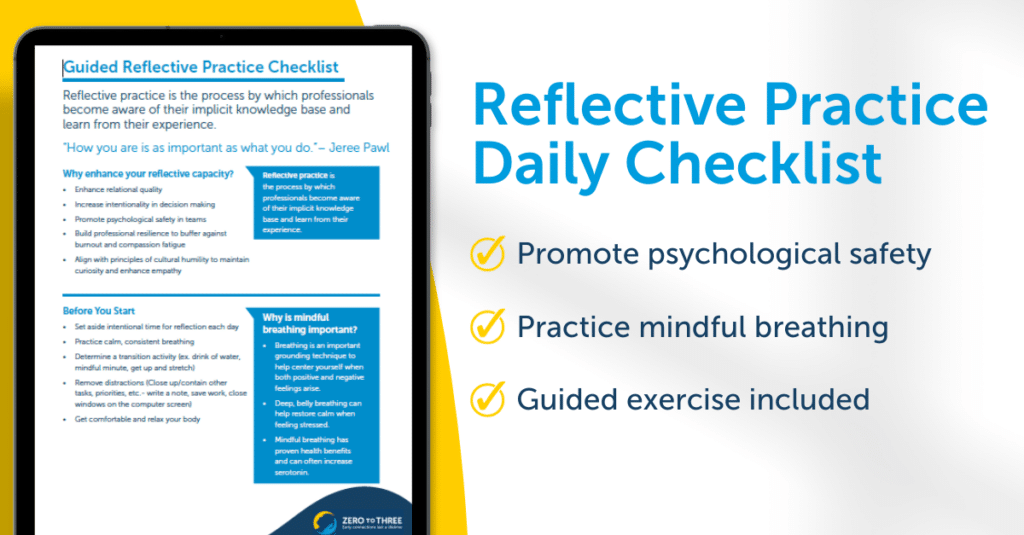Leadership Self-Assessment Tool

[addthis tool="addthis_inline_share_toolbox"]
Reflective Leadership
Take a few minutes to find out your strengths and opportunities for growth.
Reflective leadership is characterized by self-awareness, careful and continuous observation, and respectful, flexible responses that result in reflective and relationship-based programs. The following Leadership Self-Assessment is a series of statements and reflective questions that offer insight into your leadership style to help you identify your strengths and opportunities for growth.
Instructions:
Rate yourself on a scale of 1 (Rarely), 2 (Sometimes), or 3 (Almost Always) on the following statements.
| Self-Assessment Statements | Rating |
|---|---|
| 1. In a discussion, I can see areas of agreement among differing opinions. | 1 2 3 |
| 2. I lead by example, not just by words. | 1 2 3 |
| 3. I notice good work and I give staff positive feedback. | 1 2 3 |
| 4. I recognize the value of humor in the workplace. | 1 2 3 |
| 5. I have a vision of where the agency/center/project I lead is going and can communicate it to others. | 1 2 3 |
| 6. When something is not going right for one of my staff members, I take the time to help them think it through and develop an approach to solving it. | 1 2 3 |
| 7. I am comfortable telling others when I don’t know the answer to a particular question. | 1 2 3 |
| 8. I make sure we celebrate as a team when we meet milestones. | 1 2 3 |
| 9. I have ways of handling the pressures of my position that allow me to think and strategize even in the midst of crisis. | 1 2 3 |
| 10. I focus the work of the agency/center/project I lead around the children and families we serve. | 1 2 3 |
| 11. I make sure people know that it is safe to share their opinions and to say what they really think and feel. | 1 2 3 |
| 12. I encourage people to let me know what they need in order to work well and, whenever possible, ensure that they get it. | 1 2 3 |
| 13. I gather input from others and involve staff in decision-making. I devolve decision-making whenever appropriate. | 1 2 3 |
| 14. I make opportunities to stay current about issues in the field. | 1 2 3 |
| 15. I think before I act. | 1 2 3 |
| 16. I meet regularly with the staff who report to me. | 1 2 3 |
| 17. I solicit feedback from my staff about my own performance. | 1 2 3 |
| 18. I have a mentor or supervisor in the organization. | 1 2 3 |
Understanding Your Responses
If your responses were mostly:
Ones:
Reflective leadership and supervision may be new to you or your organization. Consider attending an external training session on reflective supervision and relationship-based organizations. You also may wish to do some independent reading on reflective supervision. See articles in the ZERO TO THREE Journal for additional resources.
Twos:
Reflective leadership and supervision is not entirely new to you, but you may be hesitant to fully implement it in practice. Beginning with the areas you marked as “ones,” work with your supervisor to identify experiences that will help you build your skills and use them with confidence. Consider attending workshops or conferences on the subject.
Threes:
You are comfortable using reflective leadership and supervision with your staff and have integrated many facets of this approach into your daily work. You can expand your knowledge and continue growing by identifying your next challenges, for example: develop your own training session on reflective supervision, mentor a colleague, and continue to take external classes and conferences.
Excerpted from: Parlakian, R., & Seibel, N. L. (2001). Being in charge: Reflective leadership in infant/family programs. Washington, DC: ZERO TO THREE.



